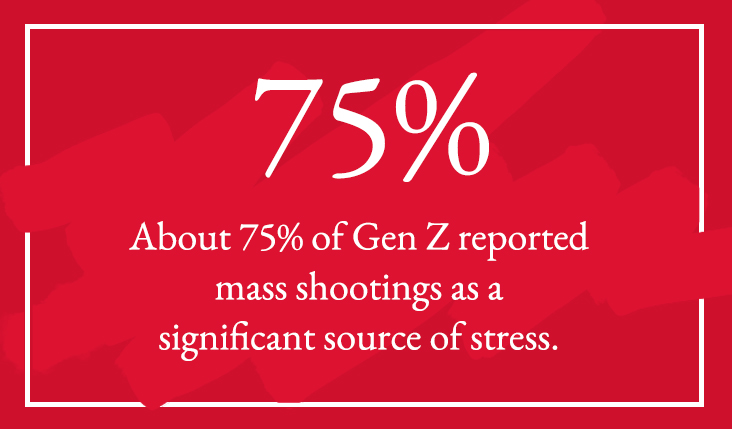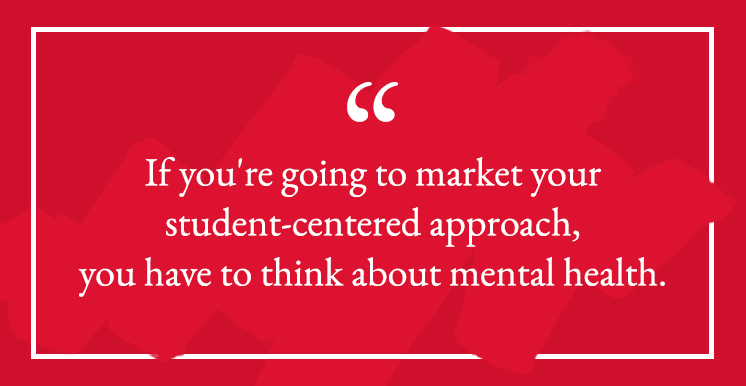
Gen Z and Mental Health: What Colleges Should Know
Lately, we’ve had dozens of conversations with colleges and universities about Gen Z and mental health. Institutions are talking about whether they’re marketing their wellness resources appropriately. Some aren’t sure they have enough resources, or if they should even make the topic a big deal.
Our response to the latter?
Yes!
Based on new data and our own qualitative research, mental health is important to Gen Z and should be for you too. Here’s why, followed up with a few examples of what colleges are doing and what you can do too.
Gen Z is stressed out and here’s why.
In 2018, the American Psychological Association’s annual Stress in America Report interviewed nearly 3,500 people ages 18 and older, and 300 teenagers ages 15 to 17.
Guess which generation reported the worst mental health?
Gen Z, with stress largely to blame.
In fact, 91% of Gen Z adults surveyed said they felt physical or emotional symptoms like depression or anxiety, associated with stress. According to the report, sources of that stress include gun violence, rising suicide rates, sexual harassment, migrant family separation, and climate changes—all national issues. Time’s article, More Than 90% of Generation Z Is Stressed Out. And Gun Violence Is Partly To Blame, notes that other surveys have shown that high levels of loneliness and social media are also impacting Gen Z’s stress levels and mental health overall.
Now think about all this from where you sit.
You work at a college or university that presumably empowers its students to explore and tackle these national issues. You likely have access to resources that can help students practice self-care. And you’re probably telling parents in one way or another to “trust us.”
So, you could argue that you’re in the perfect position to address Gen Z and mental health and do something about it if you’re not already.
School safety is a top concern.
If you dig further into the issue of gun violence causing stress and affecting Gen Z’s mental health, things get more specific. CNN’s coverage of the mental health report lays out these stats:
- About 75% of Gen Z reported mass shootings as a significant source of stress, and 72% said the same in regards to school shootings
- About 56% of those in school say they experience stress when considering the possibility of a school shooting
- 74% of parents fear school shootings or the possibility of one

Perhaps now more than ever, it’s crucial for schools across the country to take these fears to heart, and many have.
The University of Nevada Las Vegas is spending $16.5 million to upgrade its campus security infrastructure.
Northwestern University released a five-minute “run, hide, fight” video that teaches its students what to do in the event of an active shooter.
Security measures aside though, consider what you can do off camera. In an Education Dive Deep Dive, Ron Avi Astor, a professor of behavioral health at the University of Southern California, says schools are safer when they cultivate social and emotional health and respond to troubled students quickly. Campus security expert Brian Van Brunt adds, “Mental health counselors must be better trained to identify and help students who could pose a threat to campus or themselves.”
Mental health problems can negate the benefits of attending college, but you’ve got options.
According to the Suicide Prevention Resource Center, mental health problems can affect a student’s energy level, concentration, dependability, mental ability, and optimism, hindering performance. They also cite research that shows that depression is associated with lower grade point averages. Peers, family members, faculty, and staff could be affected out of concern, and campuses too can feel the burden when students with mental health problems do poorly or drop out.
And we all know what poor student retention can do for a campus: low morale, loss intuition, even lower alumni donations.
As a higher education marketing agency, we know first-hand that some schools are worried about what it may look like to address mental health. Some have even been hesitant to use “gen Z and mental health” in the same sentence.
But this point alone should be enough to realize that confronting the issue and working to support these students will not only benefit them and their futures but the college’s success as well.
(Of course, the students should be the number 1 priority, but if you need reasons to convince your higher-ups to make changes, this should help too.)
See how other colleges and universities address mental health.
If you’re going to market your student-centered approach, your personal attention angle, or your status as a cutting-edge institution that prepares students for a lifetime of success, you have to think about mental health.
A few examples of what some schools are already doing:

The University of Richmond is building a new Well-Being Center, described as a comprehensive and integrated facility that will include all campus health care in one location. The school’s site says:
“The Center will impact retention and graduation rates of our students by providing affordable and convenient health and wellness services and programs delivered by professionals attuned to the unique stressors and needs of college students.”
Siena College recently posted two Q&As on their admissions blog on the topics of mental health and wellness at Siena, featuring interviews with their Director of Health Promotion and their Director of the Counseling Center. In each, you can read about the liberal arts school’s new initiatives, including their psychoeducational skills-building groups, their “Let’s Talk” series, their “art of presence” philosophy, and more.
The University of South Florida created a new three-tier system called MWell4Success to better address students’ mental health needs; the first tier requires all incoming students to take mental health literacy training. They also launched a wellness coaching service that’s free to all students and includes a Skype option. Another addition: nap pods, massage chairs, and bean bags.
Drexel University‘s Counseling Center offers anonymous online mental health screenings—free for students, faculty/professional staff, and members of the general public. Answer a few questions, and you’re led to insights and resources that are relevant for your responses, including Drexel/Philly resources, national resources, phone lines, and more.
Gen Z, mental health, and your college. A few ideas for you:
Even on tight budgets, there are ways you can prioritize the mental health of your students—and get the word out to your prospective audience and their influencers (we are marketers, after all).
- Offer free mental health screenings.
- Create stress-free stations or peaceful nooks across campus—spots designed to give students a mental break. Think bean bags, hammocks, aromatherapy, soothing music, anything that gives them space.
- Promote a campus-wide challenge to stomp out the stigma of mental health. Ask participants to get creative in how they would normalize mental health among college students.
- Bring speakers to your campus, including alumni who have relevant careers or stories and could speak to the importance of practicing self-care.
- Give campus visitors the option to tour your wellness or counseling facilities.
- Hold your team accountable and make this a part of your strategic plan!
Imagine a future with less stressed college students? What a world that would be.
In the meantime, feel free to reach out to us. We’d love to hear what you’re doing in the mental health space or brainstorm ways we could help.
